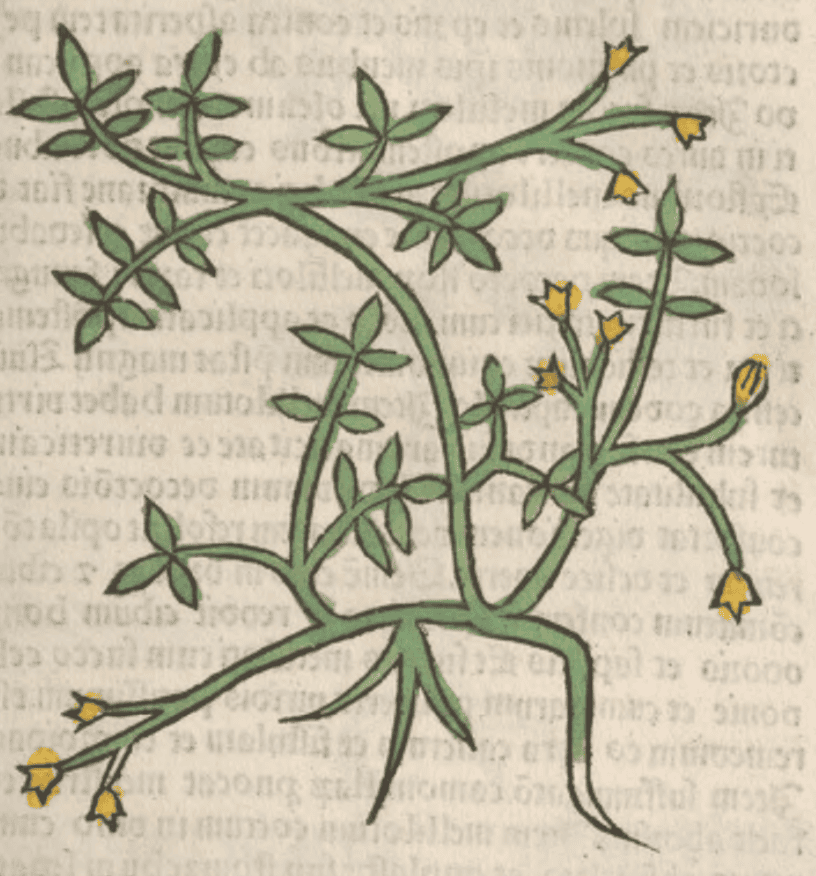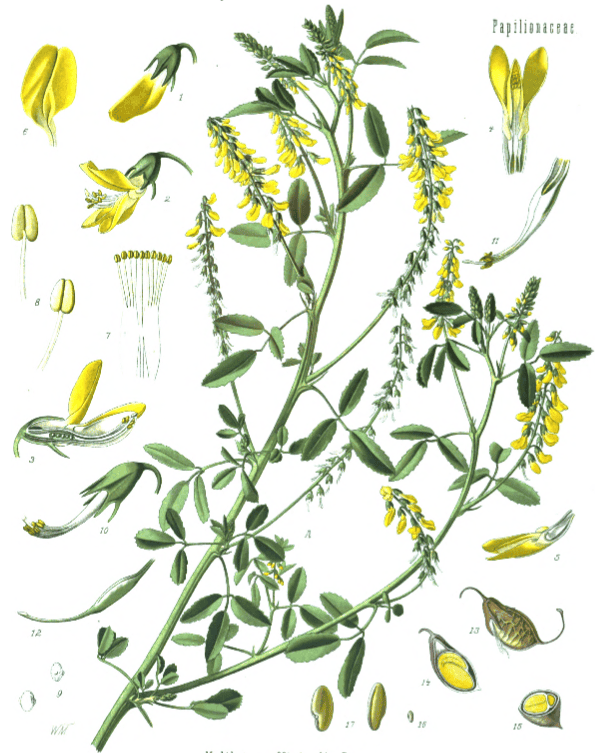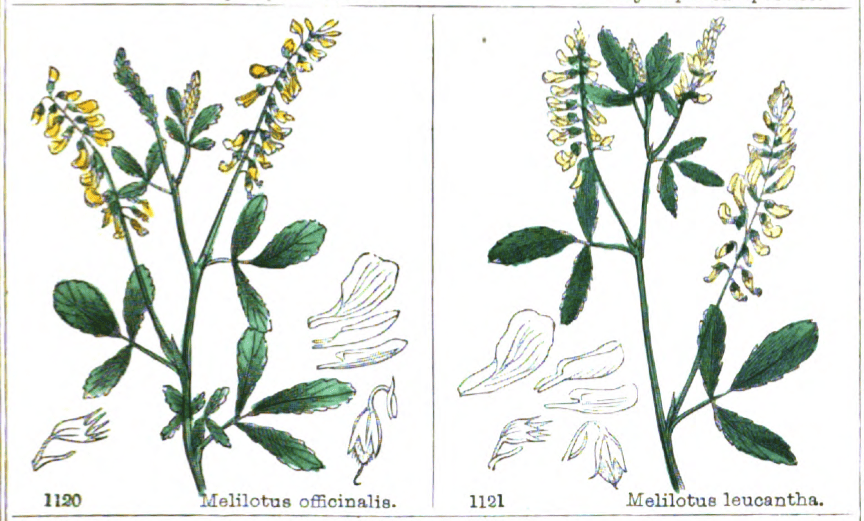Melilotus, Meliot
Sweet Clover, Yellow Sweet Clover, King’s Clover, Wild Clover, Hay Flowers, Sweet LucerneIklil-ul-Malik, Nakhuna (Unani)
Rgya spos རྒྱ་སྤོས་ (Tibet)
 Herbarius latinus, Petri, 1485
Herbarius latinus, Petri, 1485 Koehler’s Medizinal Pflanzen, 1887
Koehler’s Medizinal Pflanzen, 1887 M. officinalis and M. leucantha
M. officinalis and M. leucanthaFlorigraphia Britannica, Deakin, 1857
Botanical name:
Melilotus spp.
- M. officinalis (syn. Trifolium melilotus)-Official species
- M. leucantha
- M. altissima (Tall Meliot)
- Melilotus suaveolens (used in Tibetan Medicine)
Parts used:
Herb
Temperature & Taste:
Cool, dry
“It is Hot in the First degree with some Dryness”. (Avicenna)
Classifications:
2L. EMOLLIENT 2Q. ANODYNE
Uses:
1. Moves the Blood, Relieves Swelling, Clears Stasis:
-Venous Congestion, Varicose Veins, Hemorrhoids, Thrombosis, Thrombophlebitis etc;
-Lymphedema and Lymphatic Congestion.
-Traditionally used for all types of Hard Tumour.
-Night Cramps of the Legs.
2. Clears Heat, Resists Poison, Eases Pain:
-all types of swelling and Inflammation with pain, for which it was commonly used internally and topically.
-“Useful in hot and hard inflammations” (Avicenna)
-Epidemic diseases with inflammation, Heat and Toxic diseases (Tibet)
-Diphtheria (Tibet)
3. Clears Damp, Promotes Urine:
-Edema, Swelling or Heaviness of the Legs
-Inflammations with Fluid Swelling.
-also to clear damp from the joints.
4. Clears Phlegm, Stops Cough:
-tough phlegm congesting the Lungs with Cough, Wheezing etc.
5. Externally:
i. topically to promote healing of Wounds; also Running Ulcers.
ii. the juice is dropped into the eyes to clear the Sight from films and skins that obstruct them
iii. juice dropped into the ears for Earache, and for Tinnitus
iv. Culpeper said ‘The Head often washed with the distilled Water of the Herb and Flowers, or a Lye made therewith, is effectual for those that have suddenly Lost their Senses; as also to strengthen the Memory, to comfort the Head and Brains, and to preserve them from pains and the Apoplexie’.
v. the juice mixed with vinegar, or vinegar and rose water was used as a head wash for Headache
vi. in poultices for Swellings of the Genitals and elsewhere
vii. a Lye of the herb is used as a wash for Running and Spreading Ulcers of the Face, Head or elsewhere.
viii. often combined with Camomile in Enemas and Douches for Heat and Inflammatory conditions.
Dose:
Infusion: 2–4 grams
Powder: 1–2 grams
Correctives:
Honey, Figs
Substitutes:
1. Camomile (Unani)
2. Cheiranthus roseus has been listed as a substitute used by Tibetans living in Russia.
Main Combinations:
Often combined with Camomile
1. Heat of the Blood, Meliot with Dead Nettle and Violet
2. Stomach pain, Meliot with Camomile, Rue, Marjoram, Pennyroyal Rosemary Cumin Aniseed Fennel seed
3. Emollient:
i. Meliot with Mallow leaf, Linseed, Camomile (Emollient Powder)
ii. Emollient, Meliot, Pellitory of the Wall, Betony, Marshmallow, decocted and applied (Herbarium Horstianum, 1630)
4. Poultice for pain and swelling, Meliot with Camomile, Linseed, Fenugreek, Rue
5. Steam bath for Otitis and Otorrhea, Meliot with Rose Mallow, Camomile, Horsetail
6. Tinnitus:
i. a tincture, Meliot with Marjoram, Rue, Stoechas, Wild Mint, Camomile
ii. as an oil Meliot with Camomile, Marjoram, Sage
7. Shingles Oak bark, Lady’s Mantle, Meliot, Oats, Camomile, decocted in water and used as a wash. (Treben)
8. Pleurisy, Meliot, Pellitory, Betony, Marshmallow, Camomile, decocted as sponged onto the ribs (Herbarium Horstianum, 1630)
9. Red and Sore Eyes, Meliot, Hyssop, Marjoram, Fenugreek, Camomile, Rose (equal parts). Boil and let the vapors go to the eyes.
10. Ointment for Pain, Henbane leaf, Camomile, Mallow, Meliot, Mullein, Dill leaf, Marshmallow root, Fenugreek, Linseed; boil in Olive oil, strain and with wax form an Ointment
11. Sedative Emulsion: Peach kernels (1 oz.), Hemp seed, Poppy seed (half oz. each), Meliot Water, Water Lily Water (4 oz. each). Form an emulsion, adding Spirit of Camphor (half oz.). Applied to the forehead
12. Hardness of the Liver, Spleen, Kidneys, or swollen Glands, apply Plaster of Meliot. (Herbarium Horstianum, 1630)
Cautions:
1. Large doses can cause headache, and stupor.
2. Use cautiously during Pregnancy and avoid large doses.
3. Some very sensitive people may show increase in Liver enzymes while taking the herb. This is said to return to the previous levels when discontinued.
4. According to Unani, it has an adverse effect on Testicular function is used long-term or in large doses.
Main Preparations used:
Distilled Water
